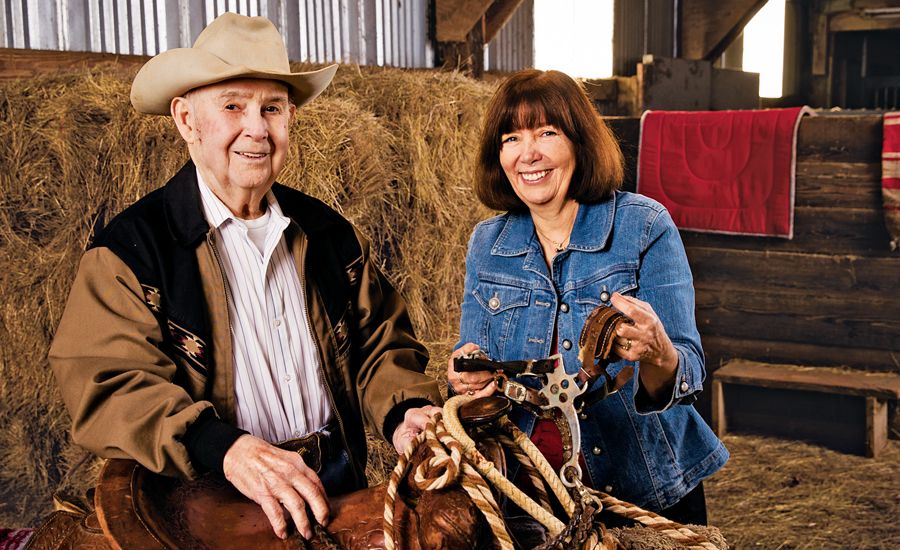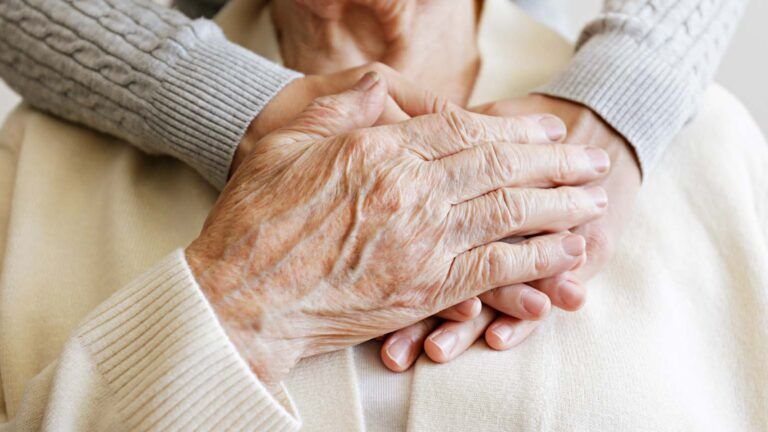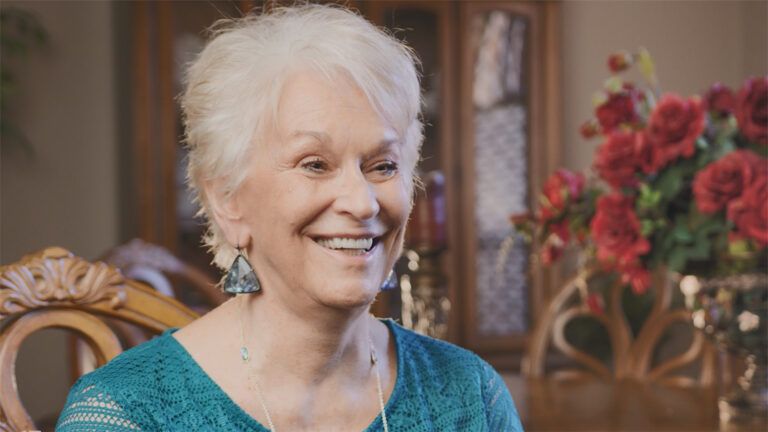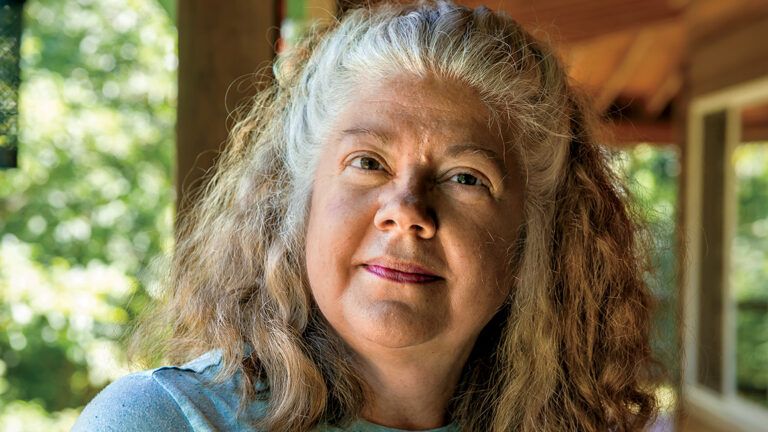“Maybe the nurses are right. Maybe he needs to go to a nursing home.”
I knew my sister was only thinking of what was best for Dad. Still, what she said made me recoil. For the last three weeks—ever since our 86-year-old father had suffered a stroke following successful heart-valve-replacement surgery—my siblings and I had practically lived at the hospital.
There was one of us with him at all times. We were committed to being advocates for him, even if we didn’t always agree on the specifics of his care. This was the first time all four of us had left Dad’s room, and it was only because we didn’t want to upset him by discussing this in front of him.
The hospital was going to discharge him soon. The question was, to where? We were sitting in the cafeteria—my two older sisters, my younger brother and I—that June night trying to come to a decision. None of us had been getting enough sleep. Tempers were frayed. I prayed for the right words.
Maybe I should just keep it simple. “He wants to go home,” I said. “We need to help him get there.”
READ MORE: A QUICK VISIT WITH HER EARTHLY FATHER IN HEAVEN
My siblings stared at me.
Just two months before, Dad had been his strong, vital, independent self. Living alone, after Mom died, on their 100-acre ranch in western Oregon—God’s country, as he called it. Driving his truck, cooking, taking care of his beloved horse, Cotton, even digging postholes.
But the stroke had left him unable to walk or swallow. He could barely speak. I’d never seen him so frail, never even thought of him as old. Until now.
I wanted to tell my sisters and brother why it was so important that Dad get back to the ranch, that it was the place he felt most inspired, but he’d made me promise to keep his secret.
He was writing a novel. It was his first, a Western romance that he’d dreamed up the previous fall. He was 300 pages into it, and was determined to see it through.
Initially he’d told me about the story he had come up with—a cross between Louis L’Amour and Zane Grey—because he wanted me to write it. After all, I worked part-time for a literary agency. But I was trying to write my own first novel, a historical romance. “Why don’t you write it?” I said. “You obviously have the inspiration.”
He’d agreed, but asked me not to tell a soul—not even my siblings—what he was up to. Dad wasn’t a writer. He was a Navy pilot who traded airplanes for horses when he retired to the ranch. He didn’t want anyone laughing at him. That, I understood.
Dad was so set on completing his novel that he’d called me into his hospital room before his surgery. “I want to tell you the end of the story,” he said. “Just in case.”
“You don’t need to do that,” I said. “You’ll be home before you know it, writing the last pages while you recover. God isn’t finished with you yet.”
He shook his head. “Now listen.” He told me in detail how he wanted his novel to end. It was so beautiful I had a hard time holding back my tears.
How could I persuade my siblings and the doctors and nurses that Dad needed to go home to recover when I had no idea how he—or we—could manage it? All of us kids lived an hour or two away from the ranch. We had jobs, family commitments. I didn’t know anything about being a caregiver. Still, and maybe it was the hopeless romantic in me, I thought there had to be a way we could make this work.
The night server was closing up the cafeteria. “Look, I want the doctors to know what Dad’s like when he’s not stuck in a hospital bed,” I said.
“I don’t know if that’s going to change anything, Becky,” my oldest sister said gently. “Let’s just agree that we’ll do whatever the heart surgeon thinks is best.” Heads nodded. Reluctantly I agreed. Silently I prayed.
LEARN MORE: AMY GRANT’S THREE CAREGIVING TIPS
The next day I brought in a large framed photo I’d taken of Dad wearing his cowboy hat. I set it on the window sill in his room. Dad was still sleeping, but when the surgeon came by on rounds, I made sure he saw it. “My dad isn’t the type to sit around,” I said. “He needs to be home, where he can get outside and feed his horse. The ranch is the place where he feels most alive.”
The surgeon studied the photo. “Your father would need someone to be with him round the clock for at least a year,” he said. “Even if he’s able to get back on his feet, the risk of him falling is too great for him to be alone.”
“We can do that,” I said, without stopping to think what I was actually signing myself—not to mention my siblings—up for.
“He’ll need to go to a rehabilitation center first to build up his strength,” the surgeon said. “If they feel that he’s made good progress, then, sure, let’s get him back home.”
I told my siblings his advice. They agreed to try it. “But if it doesn’t work out, we’ll have to look at other options,” my older sister said.
That afternoon I sat by Dad’s bed and took his calloused hand in mine. “After rehab, you’re going home,” I told him. “We kids will take turns staying with you. And you’ll be able to finish your book. Isn’t that great?”
Dad struggled to speak, but no words would come. He settled for weakly squeezing my hand. I squeezed back, hoping we’d made the right decision.
He did well in the rehab center. He came home to the ranch in August able to get around with a walker, dress himself and eat soft food. I stayed with him the first few days, cooking and doing housework, organizing his medications. I stuck close any time he was on his feet to make sure he didn’t fall.
Friends had fed his horse while he was in the hospital, but now he insisted on taking care of Cotton himself. The stubborn glint in his eye told me I was only allowed to tag along. He swapped his walker for a wheelbarrow, forked hay into it and slowly pushed it to his horse. Cotton nickered softly, as if to say, I knew you’d come back.
Dad’s physical therapist came for her first visit and couldn’t believe how far along he was. After the second week, she never came back. “Whatever you’re doing is better than anything I could come up with,” she said.
But doing chores couldn’t restore Dad’s ability to communicate. He had no trouble reading the messages and prayers people posted on the CaringBridge web page my brother had set up for him. He knew how he wanted to reply, but struggled to form the words. It was as if they were trapped in his brain.
My siblings and I took turns staying with Dad, rotating every three days so none of us got burned out. We drove him to church, doctors’ appointments, the grocery store, the speech-therapy clinic. He really took to his therapist, Shawn, who worked with him on vocal exercises, relearning sounds and speech patterns. Back at the ranch, we’d go over the exercises with him twice a day.
As the weeks went by, the words came. Haltingly at first, but after five months of therapy, Dad was talking in short sentences. He couldn’t string together anything more, though, certainly not the paragraphs he would need to finish his novel, and that frustrated him no end.
One day when I was alone with him, I said, “Dad, you need to tell the others, and your speech therapist, about your book. How can they help you if they don’t know what really means the most to you?”
“I see your point,” he said, carefully enunciating each word.
READ MORE: 5 THINGS TO DISCUSS WITH YOUR AGING PARENTS TODAY
That weekend Dad told everyone about his book. They were surprised but supportive. “It’s pretty neat to have two writers in the family,” my oldest sister said, grinning at me. I was glad to have us all in on the secret finally.
At Dad’s next speech-therapy session, I told Shawn, “You know, Dad is writing a novel.”
“No way!” Shawn said. “I love to read. Tell me about your book.”
Dad outlined the plot. “It’s still hard for me to write,” he admitted. “To get out the right words. I’m not sure I’ll ever get it done.”
“We’ve got your speech where it needs to be,” Shawn said. “Honestly, I could discharge you today. But let me see if I can find a way to help you finish your book.”
The following week, Shawn set three prints in front of Dad, all western cowboy art, each depicting a different scene. He had Dad pick one and write three short sentences about it. “Good,” Shawn said. “Now choose two of those sentences and combine them.” Dad tackled the assignment with a shaky hand but fierce concentration. Then he was asked to add the third line to make one complex sentence. He did it!
Shawn worked with Dad until he gained the confidence to go back to his book again. “Don’t pressure yourself,” Shawn said. “Just set a goal of writing a little each day.”
It wasn’t easy. Some days it took an hour for Dad to write a sentence he was satisfied with. It was partly the effects of the stroke, and partly arthritis in his hands. Typing must have been painful, yet he kept at it. I would’ve offered to help, but Dad had that same stubborn glint in his eye as when he insisted on feeding Cotton himself. In August 2011, after he’d been back on the ranch a year, Dad declared that he was ready to be on his own again. My siblings and I joke that he kicked us out. The one thing he wasn’t able to do was drive, so we each took a weekend a month to stay with him. Saturdays we grocery shopped. Sundays we took him to church and cooked him a big dinner.
Dad’s recovery had gone so smoothly, and my siblings and I had worked together so well, I felt almost greedy asking God for more. But I couldn’t help wondering, What about his book, Lord? You know how much it means to him. At the rate he was going, he wouldn’t be done for another year.
Then, in January 2012, I got laid off. In a way, it was an answer to prayer. “Now that I have free time, I want to do something worthwhile,” I told Dad. “Let me do the typing for you. It will still be your book. Just tell me the words.”
Dad dictated the last four chapters to me, word by word. It was another way for me to be a caregiver, one I actually knew how to do. The ending was all there in his head, just as he’d described it in the hospital. I was amazed at how the sentences flowed. The last few pages had me on the edge of my seat.
The tough ex-Texas Ranger shares a dance with the woman he loves. He asks her to marry him and she says yes. My fingers were poised on the keyboard. Dad leaned back in his recliner, thinking. “Okay, let’s do it this way,” he said, then dictated, “His lips lowered to her soft waiting kiss as he swirled her in a slow circle. The dance had just begun.”
I glanced at Dad. “That’s it,” he said. “We’re done.”
“Not quite,” I said. I carried the laptop to his recliner and set it on his knees.
With a flourish, he typed, “The End.”
In May 2013 we celebrated Dad’s ninetieth birthday with a big barbecue and dozens of friends and family. The best part? The party favors: copies of a western romance, The Stagecoach Murders, by Howard Worley, hot off the press. The guests lined up to get their books signed by the proud author. It was an even better ending than any of us could have dreamed.






